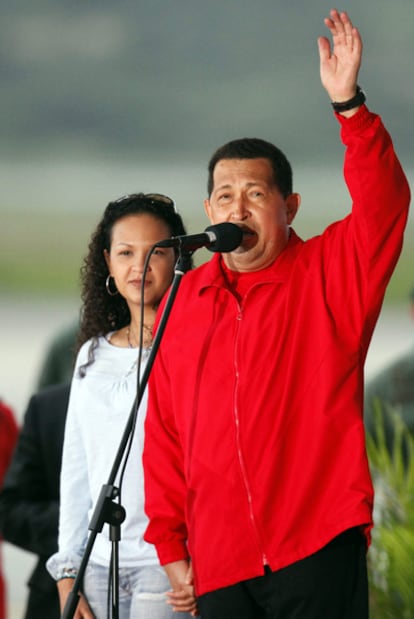Chávez "fights for his life" in Cuba
Venezuelan leader returns to Havana for cancer chemotherapy treatment
Venezuela's ailing president, Hugo Chávez, acknowledged on Monday that he was "fighting for [his] life" as he undergoes chemotherapy treatment for cancer at a Cuban hospital. The 56-year-old Chávez arrived in Havana on Saturday to begin treatment for an undisclosed type of cancer, which has forced him to give up some of his governing powers while he is out of the country.
The Venezuelan leader's illness continues to be the focus of speculation inside and outside the country. While Chávez revealed he was operated on twice in Cuba on June 10 and June 20, he did not explain what type of cancer he has. During the second operation, he said doctors removed a baseball-sized tumor near the pelvic region, but Chávez said at the time that the cancer hadn't spread.
Cuba would be better at keeping his health condition secret, say analysts
Last week, Brazilian President Dilma Rousseff suggested to Chávez that he seek treatment in São Paulo at one of the region's most famous cancer hospitals, where she also underwent treatment for a cancerous lymphoma. But Chávez declined and headed for Cuba.
Some analysts have said that the closed Communist government would offer stricter confidentiality over Chávez's condition than Brazil, where the nature of his illness would most likely be leaked to the press.
On Monday Reuters quoted a source close to Chávez's medical team in Venezuela as saying the president is suffering from colon cancer, which could require months of chemotherapy. But last week, former Vice President Vicente Rangel denied in an interview that the president had colon cancer.
On Friday during a public address in which he formally asked the National Assembly to approve his prolonged absence, the seriousness of illness was evident. His daughter, Rosa Virginia, standing next to her father, fought back tears as Chávez explained how he "must continue a difficult and long process." His defense minister, standing behind the president, also appeared choked up. It is not known how long Chávez will need to stay in Havana. Without any immediate successor, the president left some official duties to Vice President Elías Jaua and Finance Minister Jorge Giordani.
Luis Vicente León, director of the Datanálisis polling firm, believes Chávez returned to Venezuela for two weeks following his surgery to try to control the internal conflicts that flared up among members of his Venezuelan Socialist Party (PSUV) in his absence and to reassure voters ahead of next year's elections that he is still in charge.
"Of course, if he prolongs his stay away from power, it would present certain risks. Therefore, he must remain in contact with the masses," León said.
Chávez said that he will use "an electronic signature" to sign decrees and other documents during his hospital stay in Cuba.
Meanwhile, the divided opposition, which has not decided on a single candidate for next year's elections, is saying that Chávez's prolonged absence could bring instability to the country, which is already plagued by high inflation, food shortages, soaring crime and electrical power shortages.
Opposition lawmaker María Corina Machado announced her candidacy on Sunday, two days after the Attorney General's Office began investigating an allegation of corruption against the opposition frontrunner, Miranda state Governor Henrique Capriles.
Finance Minister Giordani said that there was no doubt that Chávez, who has been in office since 1999, would run for a third term. "I think there is no doubt the president will be present at the 2012 elections and then for many more years," Giordani said in an interview with state TV Monday.

Tu suscripción se está usando en otro dispositivo
¿Quieres añadir otro usuario a tu suscripción?
Si continúas leyendo en este dispositivo, no se podrá leer en el otro.
FlechaTu suscripción se está usando en otro dispositivo y solo puedes acceder a EL PAÍS desde un dispositivo a la vez.
Si quieres compartir tu cuenta, cambia tu suscripción a la modalidad Premium, así podrás añadir otro usuario. Cada uno accederá con su propia cuenta de email, lo que os permitirá personalizar vuestra experiencia en EL PAÍS.
¿Tienes una suscripción de empresa? Accede aquí para contratar más cuentas.
En el caso de no saber quién está usando tu cuenta, te recomendamos cambiar tu contraseña aquí.
Si decides continuar compartiendo tu cuenta, este mensaje se mostrará en tu dispositivo y en el de la otra persona que está usando tu cuenta de forma indefinida, afectando a tu experiencia de lectura. Puedes consultar aquí los términos y condiciones de la suscripción digital.








































